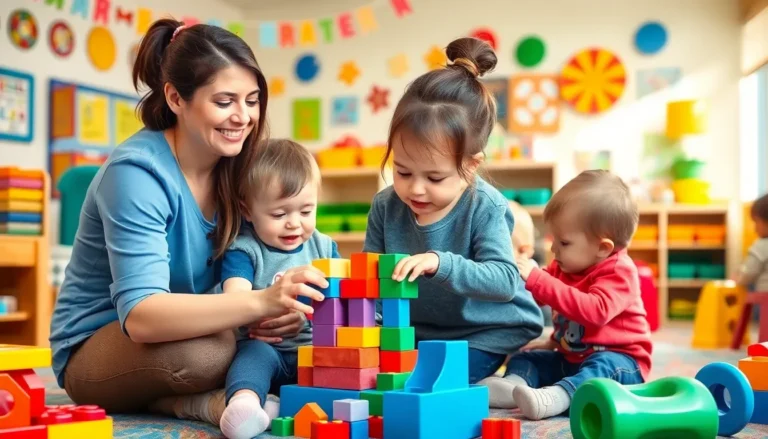In a world where every child is a potential future genius—or at least a future TikTok star—pursuing a degree in child development opens doors to a treasure trove of career opportunities. Whether they dream of shaping young minds or simply want to escape the corporate grind, those armed with this degree have the chance to make a real impact.
From educators to child psychologists, the possibilities are as diverse as a kid’s crayon box. Not only do these roles offer the satisfaction of nurturing the next generation, but they also come with a side of laughter and joy that only working with children can provide. So, if you’re ready to turn playtime into a paycheck, it’s time to explore the exciting job landscape that awaits those with a child development degree.
Table of Contents
ToggleOverview of Child Development Degree Jobs
Child development degree jobs provide diverse opportunities for professionals dedicated to the growth and learning of children. Positions range from early childhood educators to child psychologists. Individuals often find roles as family support specialists, where they assist families in navigating challenges.
Teachers play a vital role in early education settings, fostering social and cognitive skills in children aged 0 to 8 years. Child psychologists assess and address emotional and behavioral issues, using evidence-based strategies to support individual growth. Many graduates also work as school counselors, guiding students through academic and personal challenges.
Child development researchers engage in studies that inform policies and practices in education and mental health, contributing to the broader knowledge base. There’s also the option to work as child advocates, promoting children’s rights and welfare within communities and organizations.
In addition, professionals often pursue positions in parenting education, where they teach parents effective strategies for nurturing child development. Moreover, roles in children’s program management are available, overseeing educational and recreational programs in various settings.
Salaries for these positions can vary based on role and location, with educators earning an average of $48,000 annually, while child psychologists can earn upwards of $70,000. Job growth in this field aligns with rising awareness of child development importance, indicating strong demand for qualified professionals. Overall, child development degree jobs emphasize making a positive impact on children’s lives, enhancing personal and community well-being.
Types of Careers in Child Development

Numerous career paths exist for individuals with a child development degree, each providing opportunities to impact young lives positively.
Early Childhood Educator
Early childhood educators play a crucial role in shaping children’s first learning experiences. These professionals foster cognitive, social, and emotional skills in children aged 0-8 years. Working in various settings such as preschools or daycare centers, they design engaging lesson plans tailored to children’s developmental stages. Responsibilities include monitoring development progress, guiding play, and communicating with parents about their children’s growth. With an average annual salary of $48,000, early childhood educators contribute significantly to the educational landscape.
Child Psychologist
Child psychologists assess and address the emotional and behavioral issues children experience. These professionals utilize various therapies and techniques to support mental health, often working in schools, clinics, or private practices. Developmental assessments, counseling sessions, and parent consultations form essential components of their work. This role demands advanced education, typically a doctoral degree, leading to an average salary of $70,000. Child psychologists play an integral part in helping children navigate challenges and achieve well-being.
Social Worker
Social workers specializing in child development advocate for children and families facing various challenges. These professionals provide support and resources, helping families access necessary services. Daily tasks involve assessing family dynamics, developing intervention plans, and collaborating with schools and agencies. Social workers address issues such as poverty, mental health, and abuse. A master’s degree often serves as a requirement, with salary averages varying based on experience and location.
Child Life Specialist
Child life specialists support children and families toward coping with medical challenges. Responsibilities include preparing children for medical procedures, providing emotional support, and facilitating play activities. Working primarily in hospitals, they design developmentally appropriate interventions that promote emotional and cognitive growth. The role requires a specialized certification and offers significant personal rewards through direct interactions with children. Compensation for child life specialists varies but reflects the specialized nature of their work.
Skills Required for Child Development Degree Jobs
A successful career in child development requires a combination of key skills. These abilities not only enhance work effectiveness but also significantly benefit the children and families served.
Communication Skills
Effective communication skills play a crucial role in child development jobs. Professionals must convey complex ideas in clear, understandable terms to children, parents, and colleagues. Active listening ensures understanding of children’s needs, along with expressing empathy and support. Additionally, writing skills become important for creating reports, lesson plans, and educational materials. Engaging effectively with diverse populations enhances collaboration and fosters positive relationships, all vital components in this field.
Emotional Intelligence
Emotional intelligence is essential for professionals in child development. Understanding one’s emotions and recognizing those of others can create a supportive environment. Empathy allows for stronger connections with children and families, addressing their unique experiences and challenges. Professionals equipped with emotional intelligence can effectively manage their own stress and remain calm in challenging situations. This skill also promotes resilience in both adults and children, encouraging healthy emotional development.
Problem-Solving Skills
Strong problem-solving skills are vital for overcoming challenges in child development. Professionals often face complex situations requiring quick, effective solutions. Analyzing circumstances helps identify underlying issues impacting a child’s progress. Creative thinking enables the development of new approaches tailored to individual needs. Collaborating with colleagues enhances problem-solving efforts, pooling diverse perspectives to find the best solutions for children and their families.
Educational Pathways to Child Development Careers
Various educational pathways lead to careers in child development. Degree programs and certifications equip professionals with the skills necessary to work effectively with children and families.
Degree Programs
Bachelor’s degrees in child development form the foundation for many roles. Coursework often includes child psychology, educational theory, and human development. Many universities offer specialized master’s programs that focus on advanced practices in early childhood education or child advocacy. Online degree options provide flexibility for working individuals. Advanced studies can enhance job prospects and salary potential significantly. Several institutions also emphasize fieldwork and internships, allowing students to gain practical experience in real-life settings.
Certifications
Certifications enhance qualifications in the child development field. Recognized programs, such as the Child Development Associate (CDA) credential, validate expertise in early childhood education. Various organizations offer specialized certifications, addressing topics such as trauma-informed care and child health. Completing these certifications broadens knowledge and can increase employability. Many employers prefer candidates with additional credentials, showcasing a commitment to professional development. Regularly updating certifications ensures alignment with the latest practices and regulations in child development.
Job Market and Salary Expectations
The job market for individuals holding a degree in child development remains robust. Emerging awareness regarding the significance of early childhood experiences fuels demand for skilled professionals. Educators often find many opportunities in public and private schools, earning average salaries of $48,000 annually.
Child psychologists typically command higher salaries, averaging above $70,000 per year, reflecting their specialized training and role in addressing mental health issues. Growth projections estimate a 10% increase in employment for child life specialists by 2031, driven by expanded services in healthcare settings. Family support specialists also see steady demand, with salaries aligning closely with those of educators.
Early childhood education jobs represent a significant segment of this market, particularly in urban areas where population growth stresses the education system. Job openings for school counselors grow as schools emphasize mental health support and student wellness.
Flexibility and growth opportunities are abundant through online degree programs and specialized certificates such as the Child Development Associate credential. Employers often favor candidates with advanced qualifications, so pursuing specialized master’s programs can enhance employment prospects.
Essential skills in communication, empathy, and problem-solving pave pathways for success within these roles. Skills defined as essential also adapt as the landscape of child development evolves. As professionals sharpen these skills, they enhance their ability to support children’s development and family resilience, making this field both challenging and rewarding.
Conclusion
A degree in child development opens doors to a variety of rewarding careers that positively influence young lives. Professionals in this field play a pivotal role in shaping children’s futures through education, emotional support, and advocacy. The demand for skilled individuals continues to rise, making it a promising choice for those passionate about child welfare.
With diverse job opportunities and the potential for personal fulfillment, pursuing a career in child development can lead to lasting impacts on families and communities. As the field evolves, ongoing education and skill enhancement remain essential for success, ensuring that professionals are well-equipped to meet the needs of children and their families. Embracing this journey not only benefits the individual but also fosters a brighter future for the next generation.



